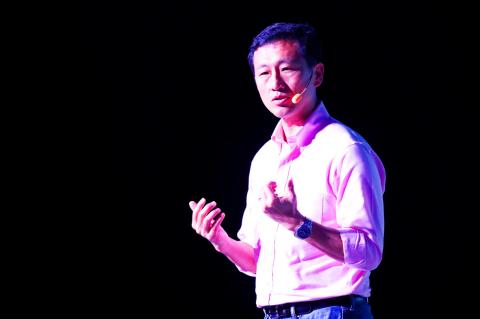Singapore yesterday pledged more incentives to encourage green lending, measures that might propel its way in a race to be a global sustainable-financing hub.
It would launch a US$2 billion green investments program, said Singaporean Minister for Education Ong Ye Kung (王乙康), who is also a Monetary Authority of Singapore (MAS) board member.
The central bank’s funds will go to projects with a “strong green focus,” and to “asset managers who are committed to deepening green finance activities and capabilities in Singapore,” Ong said in a speech at the Singapore FinTech Festival.

Photo: Bloomberg
MAS estimates that Southeast Asian nations will need US$200 billion of investments every year until 2030 in projects that benefit the environment and have low carbon footprints.
Three years ago, the central bank launched a project that offers grants of up to S$100,000 (US$73,464) to help companies fund reviews of their bond offerings to see if they comply with green financing guidelines.
As part of the green investments program, MAS would also allocate US$100 million to the Bank for International Settlements’ Green Bond Fund, Ong said.
The central bank is also poised to extend funding for financial-technology initiatives because the five-year round ending in March has yielded positive results, Managing Director Ravi Menon said.
MAS would probably announce new funding plans next year, with possible areas including cybersecurity and artificial intelligence, because the S$225 million program has spurred innovation, attracted new companies and created jobs, Menon said.
“I think it has been money that is extremely well spent,” he said in an interview before the third annual fintech festival opened yesterday. “The most important is that we now have a vibrant fintech ecosystem.”
There are more than 600 fintech start-ups in Singapore, up from about 50 in 2015, MAS data showed. That has bolstered employment at a time when automation has prompted lenders around the world to cut branches and staff.
“We’ve been creating outside of the financial sector about 1,000 fintech jobs each year,” Menon said. “This is significant at a time when the need to create jobs is more paramount than ever before.”

Intel Corp chief executive officer Lip-Bu Tan (陳立武) is expected to meet with Taiwanese suppliers next month in conjunction with the opening of the Computex Taipei trade show, supply chain sources said on Monday. The visit, the first for Tan to Taiwan since assuming his new post last month, would be aimed at enhancing Intel’s ties with suppliers in Taiwan as he attempts to help turn around the struggling US chipmaker, the sources said. Tan is to hold a banquet to celebrate Intel’s 40-year presence in Taiwan before Computex opens on May 20 and invite dozens of Taiwanese suppliers to exchange views

Application-specific integrated circuit designer Faraday Technology Corp (智原) yesterday said that although revenue this quarter would decline 30 percent from last quarter, it retained its full-year forecast of revenue growth of 100 percent. The company attributed the quarterly drop to a slowdown in customers’ production of chips using Faraday’s advanced packaging technology. The company is still confident about its revenue growth this year, given its strong “design-win” — or the projects it won to help customers design their chips, Faraday president Steve Wang (王國雍) told an online earnings conference. “The design-win this year is better than we expected. We believe we will win

Chizuko Kimura has become the first female sushi chef in the world to win a Michelin star, fulfilling a promise she made to her dying husband to continue his legacy. The 54-year-old Japanese chef regained the Michelin star her late husband, Shunei Kimura, won three years ago for their Sushi Shunei restaurant in Paris. For Shunei Kimura, the star was a dream come true. However, the joy was short-lived. He died from cancer just three months later in June 2022. He was 65. The following year, the restaurant in the heart of Montmartre lost its star rating. Chizuko Kimura insisted that the new star is still down

While China’s leaders use their economic and political might to fight US President Donald Trump’s trade war “to the end,” its army of social media soldiers are embarking on a more humorous campaign online. Trump’s tariff blitz has seen Washington and Beijing impose eye-watering duties on imports from the other, fanning a standoff between the economic superpowers that has sparked global recession fears and sent markets into a tailspin. Trump says his policy is a response to years of being “ripped off” by other countries and aims to bring manufacturing to the US, forcing companies to employ US workers. However, China’s online warriors